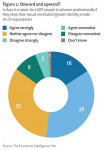Business expectations continue to rise, Economist Intelligence Unit survey shows
The barometer is a weighted average of five scores: respondents’ expectations of prospects for their company, industry, country, region and the world. Scores are on a 1 to 10 scale, and have gone up in all five areas.
Like the stock market, however, the barometer has also showed that concerns linger. Corporate Expectations Barometer: Progress report looks at trends in the barometer through December 2009. Among the findings:
· Trending upwards. Business sentiment is gradually improving, in line with GDP growth and rebounding stock markets. The full report shows a graph juxtaposing the barometer’s trend-line to that of the Dow Jones Industrial Average, FTSE 100 and Nikkei 225 indices.
· Better times at home and abroad. Prospects appear to be improving for respondents’ own companies and for the global economy as a whole. Overall, respondents have raised their 2010 global GDP growth forecast to an average of 1.8% in December (up from 0.2% in May). And more executives (29%) expect their workforce to grow than to shrink (19%) over the coming year.
· Room to improve. Yet overall business sentiment remains somewhat muted, with a score of 7.0 out of 10 (where 1 is the most negative, 5 is neutral and 10 is the most positive), as the durability of the recovery is uncertain. Global GDP growth in the second half of 2009, driven mainly by public spending and inventory restocking, may be unsustainable. In developed economies, unemployment is high and consumer confidence low, hampering growth in export-dependent countries.
· Deficit woes. Even as many have benefited from industry bailouts, companies are concerned about the longer-term implications of deficit spending. Asked which is more important, stimulating economic growth or curbing government deficits, a surprisingly large minority (36%) sided with curbing deficits. The proportion is higher in North America, where budget gaps have left some states struggling to remain solvent.
· Bank distrust. Distrust in financial services underscores another obstacle to a sustainable recovery, insufficient bank lending. In September, respondents were asked whether they trusted their country’s financial institutions more or less than they did six months earlier. Only 16% reported feeling more trust; 29% felt less trustful. Worryingly, respondents in financial services were even more negative about their industry: 36% said they were less trustful.
Notes for editors
Corporate Expectations Barometer: Progress report is an Economist Intelligence Unit report, sponsored by SAP. The quantitative findings presented are based on an online survey, conducted in May 2009, which asked executives and managers around the world about their expectations of business prospects over the next 12 months. The results were used to create the baseline for the Corporate Expectations Barometer, an ongoing index of business perceptions.
An online survey has been conducted since June, posing the same set of expectation questions as in the baseline survey. At the end of November, nearly 3,000 people had taken the ongoing online survey worldwide. The results feed into the barometer, creating a longitudinal view of evolving business expectations. The online survey also poses two topical questions, which change every month. This report looks at the barometer, and several of the topical questions, over the period from May to November 2009. The barometer is part of an ongoing programme of research tailored to executives coping with rapidly changing business conditions. The programme’s online home is www.eiu.com/sponsor/barometer.
About the Economist Intelligence Unit
The Economist Intelligence Unit is the world leader in global business intelligence. It is the business–to–business arm of The Economist Group, which publishes The Economist newspaper. As the world's leading provider of country intelligence, the Economist Intelligence Unit helps executives make better business decisions by providing timely, reliable and impartial analysis on worldwide market trends and business strategies. More information about the Economist Intelligence Unit can be found at www.eiu.com or follow us on www.twitter.com/theeiu.
About SAP
SAP is the world’s leading provider of business software(*), offering applications and services that enable companies of all sizes and in more than 25 industries to become best-run businesses. With more than 92,000 customers in over 120 countries, the company is listed on several exchanges, including the Frankfurt stock exchange and NYSE, under the symbol “SAP.”
For more information, visit www.sap.com.
웹사이트: http://www.eiu.com
연락처
Joanne McKenna, Press Liaison,
+44 (0)20 7576 8188
이메일 보내기
이 보도자료는 Economist Intelligence Unit가(이) 작성해 뉴스와이어 서비스를 통해 배포한 뉴스입니다.




